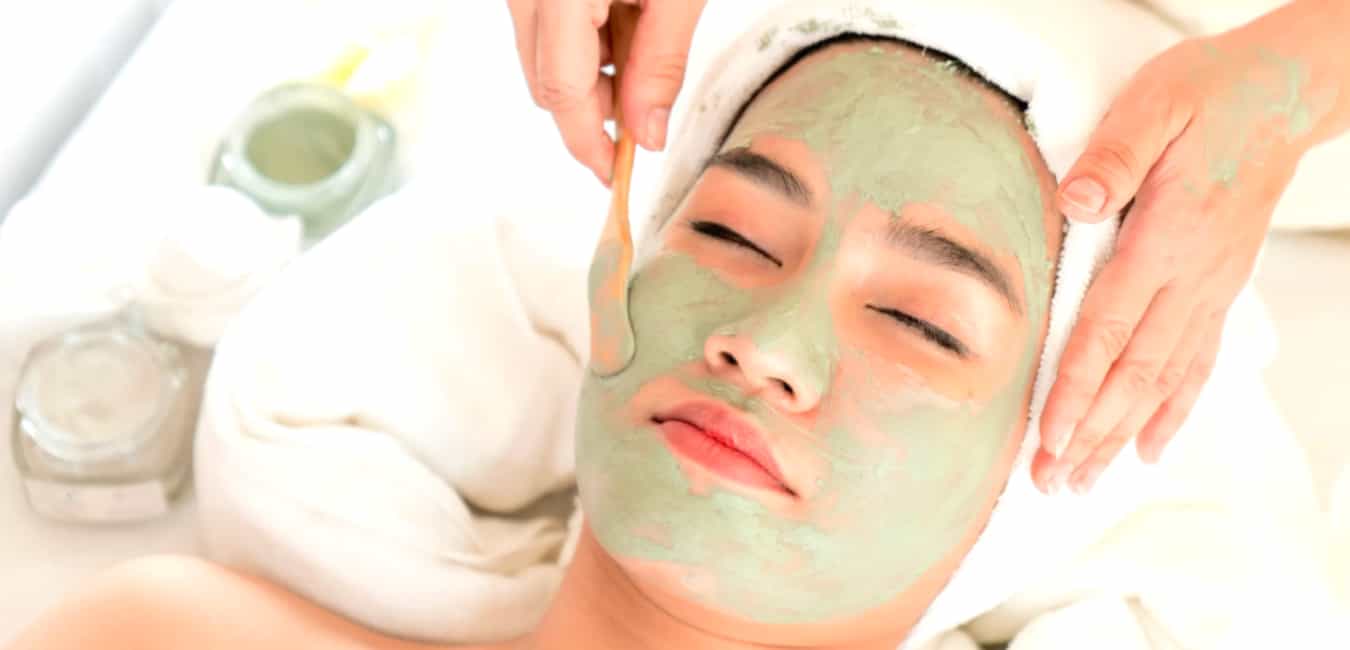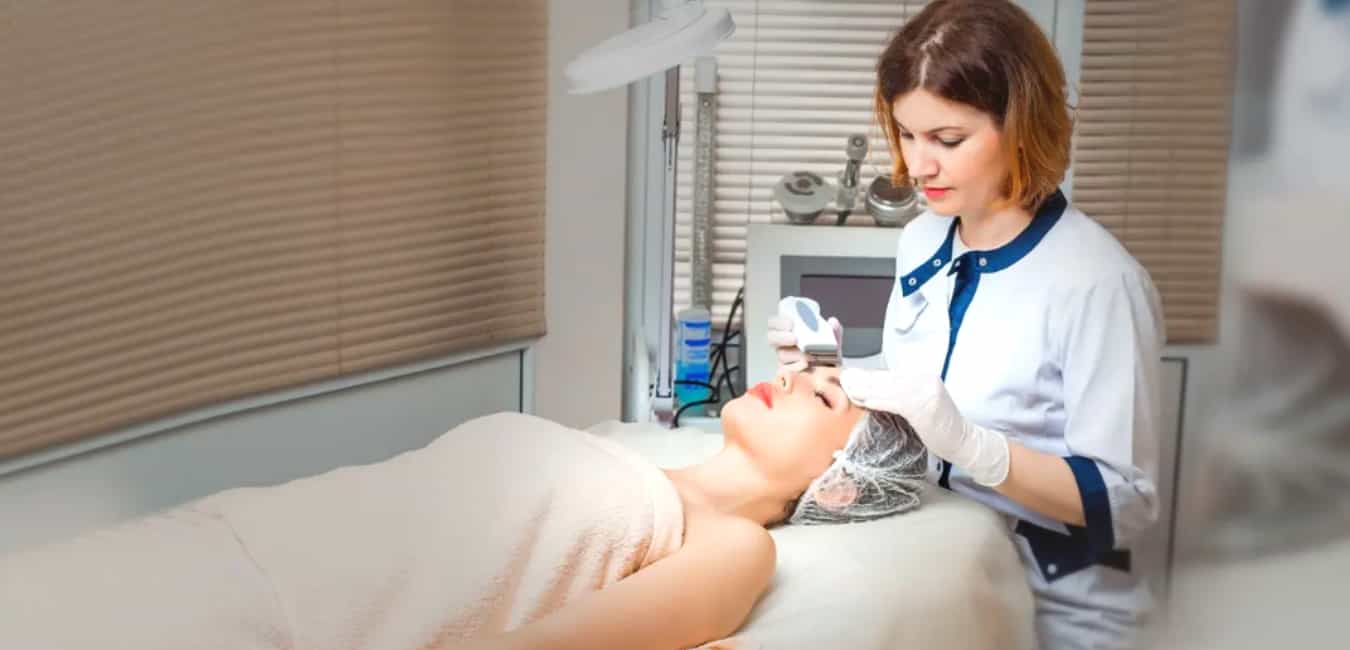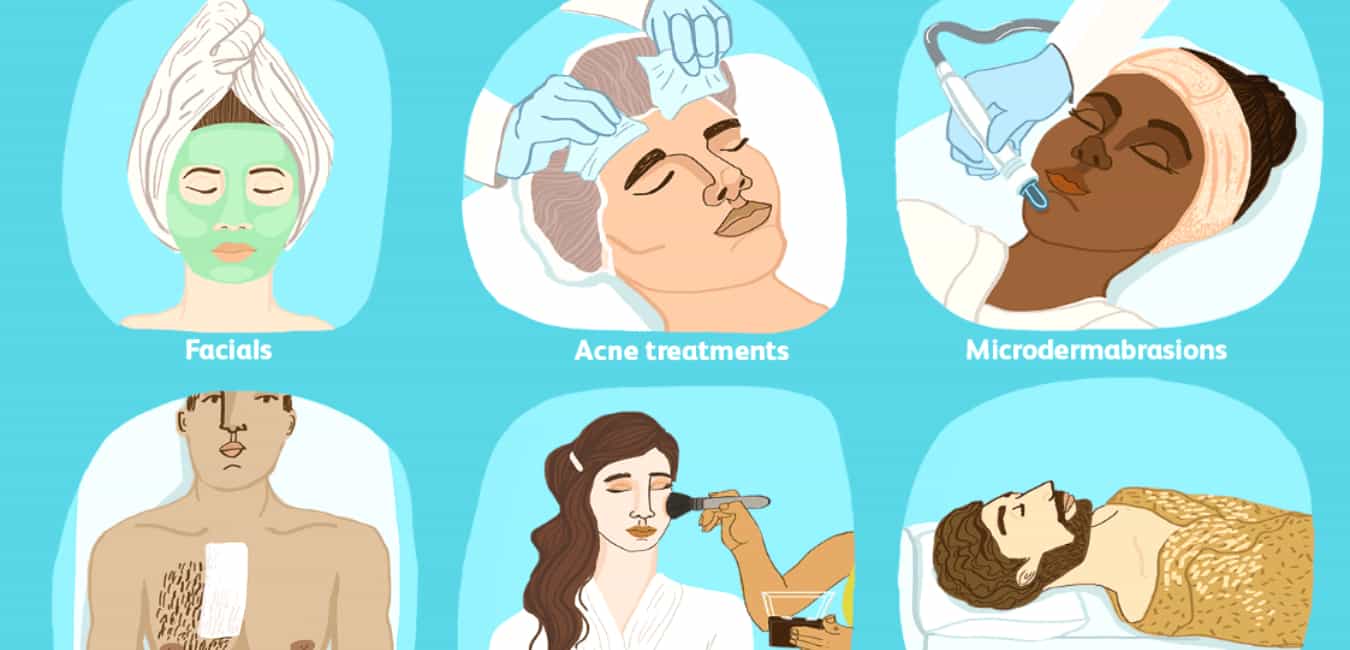Ever notice how a little pampering can turn a day around? That’s the magic estheticians work with every day, swipe, and peel. In the realm of skincare, these beauty gurus are the unsung heroes, providing not just a glow to the cheek but a lift to the spirits. It’s a practice that stretches back to ancient times when the first beauty treatments were whipped up from nature’s bounty.
Fast forward to today, and esthetician programs are the modern-day fountains of youth, springing up in colleges and shining in university curriculums. This is where science meets the age-old thirst for beauty. It’s not just a career—it’s an art that weaves confidence into the very fabric of well-being.
And let’s talk numbers—they’re as dazzling as a fresh facial. The beauty industry isn’t just blossoming; it’s booming with a predicted 17 percent leap in esthetician roles over the next decade, as per the US Bureau of Labor Statistics. That’s no small potatoes when you compare it to the national job growth average.
So, if you’ve got a knack for nurturing beauty, inside and out, there’s a spot in the spotlight waiting for you. Esthetics isn’t just about making others look good—it’s about feeling good, making it one of those rare jobs where every day, you’re the reason someone smiles a little brighter.
Table of Contents
What is an Esthetician?
So, what exactly does an esthetician do? Imagine a trusted confidant for your skin, someone who knows just how to coax out that inner glow. An esthetician is a certified skin enthusiast, an artisan of the epidermis if you will. They’re the maestros behind the serene glow of a facial, the precision of a perfect brow, and the whisper of silk that comes from expertly applied makeup, including those fluttery eyelash extensions and their subtle tints.
Now, let’s bust a myth: estheticians aren’t just about the surface dazzle. Their craft goes deeper than the dermis. They’re about holistic beauty – it’s a head-to-toe philosophy that considers how radiance on the outside reflects wellness on the inside.
And it’s not just a title one plucks from the beauty tree. A licensed esthetician is a graduate of a rigorous training regime—600 hours of mastering the craft, followed by both a written and a practical exam that’s as thorough as a cleansing routine. Wondering about the specifics? A hop, skip, and a click over to Estheticianedu.org can outline what your state expects from these guardians of skincare.
But wait, there’s more! Estheticians are versed in the secrets of reflexology, they’re fluent in the language of aesthetic science, and have a map of human anatomy and physiology etched into their minds. From safety and sanitation to conquering skin foes and disorders, their expertise is as broad as it is deep.

Unlocking the Mysteries of Your Skin: What does an Esthetician do?
Ever wonder who the guardians of glowing skin are? Enter the realm of estheticians, the dedicated artisans whose mission is to bring out the best in your skin. First off, they’re like detectives for your dermis, starting with a thorough evaluation of your skin’s needs and your beauty aspirations. These skin sages don’t just stop at what meets the eye—they delve into your daily routine to customize their skincare strategy for you.
Now, the plot thickens with the diverse missions they undertake:
- They’re on the frontlines battling skin archenemies like acne, eczema, and the sneaky wrinkles.
- Consider them your personal skin coaches, offering pro tips to elevate your skin’s health and appearance.
- With a keen eye, they assess your skin’s unique story to diagnose the unspoken needs.
- Their arsenal? Tailored treatment plans and hands-on therapies that speak directly to your concerns.
- Building trust is their superpower, nurturing a connection that turns first-timers into loyal clients.
- They’re the experts who can read your skin’s type as easily as a morning newspaper.
Sure, their role can morph based on where they practice. Some estheticians are also savvy businesspeople, hand-selecting skincare products to retail. Meanwhile, in the buzzing atmosphere of medical spas, they might don the hat of an organizer, streamlining appointments and ensuring client satisfaction from the first “hello”.
In the universe of esthetic services, variety is the spice. While some estheticians niche down to become experts in specific treatments, here’s a sneak peek at their service menu:
- Waxing to facials, they offer a smorgasbord of skin delights.
- From skin tightening to rejuvenating magic, they’ve got the wand.
- They’re the tech whizzes handling lasers for hair removal and skin resurfacing.
- Body wraps, makeup artistry, and lash extensions? Check, check, and check.
- They finesse the skin’s surface with microdermabrasion, peels, and extractions.
These skincare aficionados are also safety warriors, adhering to the highest standards. From suiting up with protective gear to educating clients on treatment aftercare, they ensure each therapy is delivered with precision and care.
But let’s get something straight—estheticians aren’t magicians with a medical degree. They won’t diagnose skin conditions or conjure up prescriptions. Yet, they’re your ally, guiding you to a medical specialist when a skin mystery needs unraveling.
The Boundaries of Beauty: What Estheticians Don’t Do
Diving into the world of skincare, you might have stumbled upon the phrase “medical aesthetics,” but let’s set the record straight—estheticians are not medical doctors. They are the maestros of the cosmetic skin care symphony, not the composers of medical treatments. While they can’t diagnose or treat medical skin conditions, they play a crucial role in the beauty orchestra.
Licensed medical professionals, like dermatologists, take center stage when it comes to medical interventions for the skin. Estheticians may work in harmony with these experts in a clinical setting, but their expertise is strictly in the realm of cosmetic care—think of them as expert consultants, not surgeons.
What’s more, estheticians have a keen eye for skin health and are trained to spot issues that require a doctor’s touch. They know when to step back and hand the baton over to a medical professional, ensuring their clients get the right care at the right time.
In sum, while estheticians provide the support and enhancement for your skin’s cosmetic needs, they respect the boundaries of their profession by not venturing into medical diagnosis or treatments. They’re your go-to for beauty, leaving the medical care to the doctors.
Clarifying the Role of a Medical Esthetician

A medical esthetician, while still rooted in the skincare industry, operates with a focus on more clinical aspects of skin health. Unlike their spa-based counterparts, these professionals often collaborate with dermatologists and plastic surgeons, providing pre and post-operative care that complements medical treatments.
However, it’s a common misconception that medical estheticians can prescribe medication or perform surgeries; this isn’t the case. What they do is work closely with medical staff to offer therapeutic facial treatments, assist with skin care regimens post-surgery, and sometimes apply makeup to minimize the appearance of scars and skin conditions following medical procedures.
Their realm is the bridge between cosmetic skincare and medical treatments, enhancing the healing journey and supporting patients with non-invasive skincare solutions. They don’t replace the expertise of a medical doctor, but they do add a layer of care that is both comforting and beneficial for individuals navigating medical treatments for their skin.
Understanding the Services of a Medical Esthetician
Medical estheticians are specialists in the field of non-invasive skin care treatments. Despite some misconceptions, they do not diagnose skin conditions nor do they prescribe medications. Their expertise is particularly valuable in supporting the skin care process before and after medical procedures. Here’s a clearer view of what medical estheticians do:
- They conduct thorough skin evaluations to determine the appropriate skin care treatments and products, but they stop short of making medical diagnoses.
- They offer guidance and perform treatments to maintain and improve the appearance of the skin, addressing concerns like dryness or sensitivity, often aggravated by medical treatments.
- Medical estheticians have the skill to apply specialized makeup techniques to camouflage scars and skin imperfections resulting from surgical procedures or conditions like acne.
- They are trained to perform a variety of procedures such as chemical peels, facials, and hair removal techniques. It’s essential to note that the specific treatments a medical esthetician provides will depend on their individual training and the regulations of the state they practice in.
Their role is fundamentally to provide supplemental skincare that complements a patient’s medical treatment plan, enhancing both the health and aesthetic of the skin during and after recovery.
Exploring the Role of a Holistic Skincare Specialist

Embarking on a career as a holistic esthetician means entering a field where the art of beauty converges with the science of health. This role diverges from the traditional paths in esthetics, focusing instead on a whole-person approach to skincare. By using non-invasive, natural treatments, holistic estheticians dedicate themselves to enhancing their clients’ skin and nail health, ultimately contributing to their overall well-being.
In the realm of holistic esthetics, each client is a unique tapestry of needs and aspirations. Here, treatments transcend the skin’s surface, aiming to nourish the individual’s body, mind, and spirit. The holistic esthetician’s toolkit is brimming with high-quality, natural products, and their techniques eschew harsh procedures in favor of gentle, supportive care.
As the wellness industry flourishes, the demand for holistic skincare experts does too, making the holistic esthetician salary a reflection of the growing appreciation for sustainable beauty practices. Those considering this career can look forward to potentially lucrative opportunities, with the added bonus of contributing to a healthier world.
For aspirants wondering how to become a holistic esthetician, the path is clear: seek out specialized education that not only covers the fundamentals of skin and nail care but also delves into the holistic philosophies that will inform your practice. Certification programs that focus on organic skincare, nutritional wellness, and holistic health practices will set the foundation for a career that’s both financially and personally rewarding.
By blending passion with knowledge, and intertwining nature’s gifts with skilled care, holistic estheticians can expect to forge a career that’s as impactful as it is profitable.
What can you do with an esthetician license?
An esthetician can examine the skin of their customers. They can also suggest surgeries and skincare products to their patients. A Licensed esthetician can do the following tasks;
- Can give hair removal services.
- Can Apply cosmetics and skincare.
- Can Give massages
They can also operate in a variety of settings, including:
- Spas
- Hotels
- Resorts
- Salons
- Hospitals, clinics, and health centers
There are so many other career options that a licensed esthetician could opt for.
What does an esthetician offer?
Specific treatments vary according to the esthetician and state regulations, however, these are the most popular services that licensed estheticians commonly offer;

- Skin analysis
- Facial treatments
- European Facial
- Lymphatic Massage Facial
- Acupuncture Facial
- Microdermabrasion
- LED Light Facial
- Anti-Aging Facial
- Brightening Facial
- Hydrafacial
- Dermaplaning
- Body Treatments
- Chemical Peels
- Waxing And Hair Removal
- Makeup Application
- Lash And Brow Services
What is an esthetician’s salary?
The skin care services industry is more popular than ever, with everything from anti-aging and rejuvenation skincare for the face and body to waxing and makeup artistry. According to the Bureau of Labor Statistics, there were 71,800 estheticians in 2018, with an increase of 11% to 79,600 by 2028.
These skincare specialists make a median pay of $31,290 ($15.05), with the top 10% making $59,790 ($28.75). These wage figures, however, don’t always convey the whole story for people whose profession is centered on skincare.
How Do You Become an Esthetician?
The processes of becoming an esthetician are as follows:
1. Acquire an esthetician’s Degree.
To work as an esthetician, you’ll need to get a degree in the field. At TAFE, you may get a certificate III in beauty services or a certificate IV in beauty treatment. It normally takes six months to complete these qualifications. A diploma in beauty therapy, which usually takes a year to complete, is another option for additional education. You can also pursue a Bachelor of Dermal Science, which normally takes three years of full-time study.
2. Develop your skills
During the practical components of your TAFE education, you will obtain practical experience. Estheticians in training typically begin with mannequins before progressing to volunteers. Before you can conduct difficult operations on your own as an esthetician, you may have to go through a lot of on-the-job training. You can also obtain work experience with a practicing esthetician to observe and fine-tune your skills while watching them doing their jobs.
3. Look for a job
You can start looking for work once you have a qualification and some experience. Think about whether you’d prefer to work part-time or full-time. Include keywords from the job description in your CV and personalize your cover letter for the job you want to apply for when looking for an esthetician job.
What is an Esthetician – FAQs
Bottom Line: What is an Esthetician?
The particular duties and responsibilities of an esthetician differ depending on the sort of medical office where they work. Medical aestheticians in burn units, for example, might instruct patients on how to care for wounded skin and how to effectively disguise scars with cosmetics.
Aestheticians may perform exfoliating treatments such as microdermabrasion in dermatology offices. They may also treat precancerous cells or provide restorative treatments. Patients receive pre/post skincare from medical aestheticians working in cosmetic surgery offices.
![How Long does it Take to Become an Esthetician [2024 Guide]](https://estheticianschools.net/wp-content/uploads/2023/11/How-Long-does-it-Take-to-Become-an-Esthetician-2024-Guide-230x162.webp)

